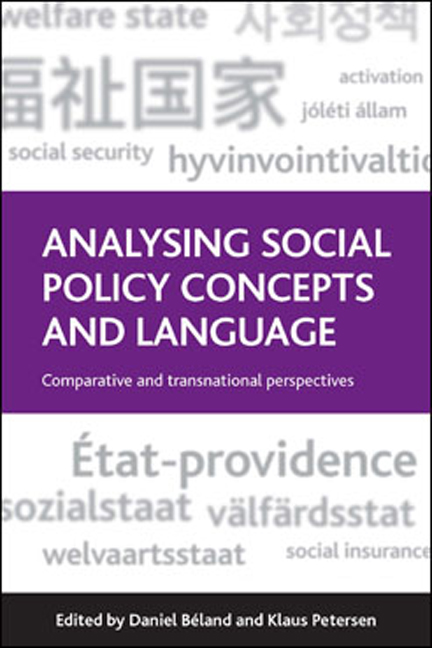Book contents
- Frontmatter
- Contents
- List of figures and tables
- Acknowledgement
- Notes on contributors
- Introduction: social policy concepts and language
- one Social policy language in Denmark and Sweden
- two The changing language of social policy in Hungary and Polan
- three Languages of ‘social policy’ at ‘the EU level’
- four The OECD's search for a new social policy language: from welfare state to active society
- five The discursive power of international organisations: social policy language and concepts in the World Bank and the International Monetary Fund
- six Original and imitated or elusive and limited? Towards a genealogy of the welfare state idea in Britain
- seven Social policy concepts and language in France
- eight The language of social politics in Finland
- nine Germany: constructing the ‘win-win’ society
- ten Conceptual development of welfare and social policy in Japan
- eleven Transition to the ‘universal’ welfare state: the changing meaning of ‘welfare state’ in Korea
- twelve The Dutch ‘caring state’
- thirteen Panacea, problem or perish: social policy language in New Zealand
- fourteen Evolving social policy languages in Spain: what did democracy and EU membership change?
- fifteen Social policy language in the United States
- Conclusion: comparative perspectives on social policy language
- Index
five - The discursive power of international organisations: social policy language and concepts in the World Bank and the International Monetary Fund
Published online by Cambridge University Press: 04 March 2022
- Frontmatter
- Contents
- List of figures and tables
- Acknowledgement
- Notes on contributors
- Introduction: social policy concepts and language
- one Social policy language in Denmark and Sweden
- two The changing language of social policy in Hungary and Polan
- three Languages of ‘social policy’ at ‘the EU level’
- four The OECD's search for a new social policy language: from welfare state to active society
- five The discursive power of international organisations: social policy language and concepts in the World Bank and the International Monetary Fund
- six Original and imitated or elusive and limited? Towards a genealogy of the welfare state idea in Britain
- seven Social policy concepts and language in France
- eight The language of social politics in Finland
- nine Germany: constructing the ‘win-win’ society
- ten Conceptual development of welfare and social policy in Japan
- eleven Transition to the ‘universal’ welfare state: the changing meaning of ‘welfare state’ in Korea
- twelve The Dutch ‘caring state’
- thirteen Panacea, problem or perish: social policy language in New Zealand
- fourteen Evolving social policy languages in Spain: what did democracy and EU membership change?
- fifteen Social policy language in the United States
- Conclusion: comparative perspectives on social policy language
- Index
Summary
In a system of global governance, international organisations (IOs) are increasingly shaping domestic policies. This is particularly the case for policy fields such as social policy, where the nation-state seems to lose power and control in times of globalisation. The World Bank and the International Monetary Fund (IMF) are two powerful IOs. They not only set policy agendas but also, at least in developing countries, have sanctioning power through their financial interventions. In addition, insofar as they define the meaning of development using particular social policy language and concepts, they also impact global discourses of social policy in developed countries.
The objective of this chapter is to trace the social policy language and concepts in both organisations over a period of more than three decades, from the 1970s onwards, when both organisations began to deal with issues of poverty and social policy in developing countries. Using documents and interviews, three distinct periods are identified for both organisations. How the language of development has changed, and thus, the role social policies play therein, are examined, from a dynamic understanding of social policy as a shift from social welfare (1970s) to social protection (1980s–90s), and finally, to social development (2000s). Based on this descriptive analysis it is argued that despite many attempts to change the development language, the econocentric orientation of both organisations leads to only half-hearted outcomes that might not be sustainable in the long run. In other words, while there has been a change in the language of development over time, the underlying meaning has remained rather stable.
In conclusion, the chapter offers a critical assessment of the impact of different social policy concepts in the broader development discourse. Language or discourse can be considered as a medium through which meaning is constituted intersubjectively. Words, ideas or thoughts come into existence only by employing language. Thus, language is constitutive of thought, and thought in turn is constitutive of reality. In this way, language is central to the constitution of reality. Consequently, definitions of social policy in the three periods not only have policy consequences but also shape people's lives through the underlying meanings they convey.
- Type
- Chapter
- Information
- Analysing Social Policy Concepts and LanguageComparative and Transnational Perspectives, pp. 101 - 126Publisher: Bristol University PressPrint publication year: 2014

